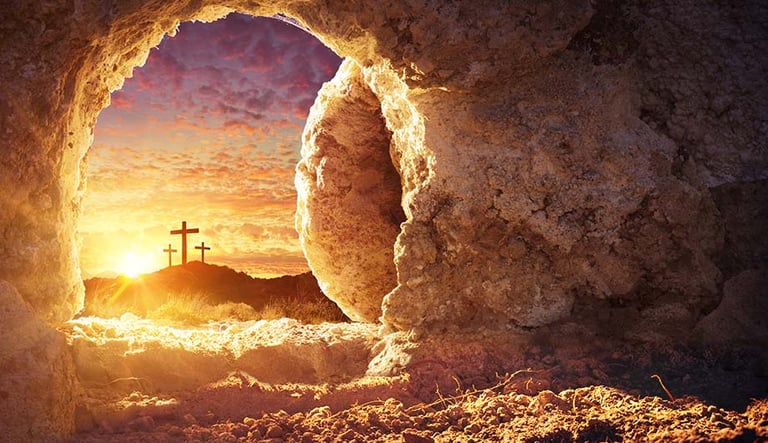

Explaining Jesus Christ’s Resurrection, The Third Day Miracle
The resurrection of Jesus Christ stands at the heart of the Christian faith. It is not merely a historical event but a transformative moment that reshaped eternity for all who believe. This miraculous event, occurring on the third day after His crucifixion, affirms Jesus’ divine nature, fulfills ancient prophecies, and provides the ultimate hope for believers. Let us explore the significance, evidence, and meaning of this pivotal moment in history.
The Significance of the Resurrection
The resurrection of Jesus is more than an extraordinary event; it is the foundation of Christianity. The Apostle Paul emphasizes its importance in 1 Corinthians 15:17, saying, “If Christ has not been raised, your faith is futile; you are still in your sins.” Without the resurrection, the story of Jesus would end in tragedy. Instead, His rising from the dead confirms His victory over sin, death, and the grave.
Jesus’ resurrection distinguishes Him from every other religious leader in history. While others have shared wisdom or moral teachings, only Jesus claimed to conquer death and proved it. This victory assures believers of their own resurrection and eternal life, as He declared in John 11:25, “I am the resurrection and the life. The one who believes in me will live, even though they die.”
Prophecy Fulfilled
The resurrection of Jesus was not an unforeseen event but a fulfillment of Old Testament prophecies and His own predictions. The Hebrew Scriptures foreshadowed this miraculous event centuries before it occurred. For instance, Psalm 16:10 declares, “You will not abandon me to the realm of the dead, nor will you let your faithful one see decay.” Peter later references this verse in Acts, affirming its fulfillment in Jesus’ resurrection.
Jesus also repeatedly foretold His death and resurrection. In Matthew 16:21, He explains to His disciples that He “must go to Jerusalem and suffer many things… and that he must be killed and on the third day be raised to life.” While His followers initially struggled to comprehend or believe His words, the resurrection proved His claims true, reinforcing their faith.
Evidence of the Resurrection
Critics and skeptics have questioned the resurrection, yet it remains one of the best-documented events of ancient history. Several pieces of evidence support its authenticity:
1. The Empty Tomb
The Gospels consistently recount that Jesus’ tomb was found empty on the third day. The women who visited the tomb to anoint His body discovered the stone rolled away, with angels proclaiming, “He is not here; He has risen!” (Luke 24:6). Even Jesus’ enemies could not produce His body to discredit the resurrection. The empty tomb, coupled with the Roman guards’ testimony, provides strong evidence that something extraordinary occurred.
2. Eyewitness Accounts
After His resurrection, Jesus appeared to numerous individuals and groups, including His disciples, Mary Magdalene, and over 500 people at one time (1 Corinthians 15:6). These eyewitnesses, many of whom later faced persecution and martyrdom, boldly testified to seeing the risen Christ. Their willingness to suffer for this truth underscores their conviction that they encountered the living Savior.
3. Transformation of the Disciples
Before the resurrection, the disciples were fearful and scattered, hiding after Jesus’ crucifixion. Yet, after encountering the risen Christ, they became courageous witnesses, boldly proclaiming the gospel even under threat of death. Peter, who denied Jesus three times, became a fearless leader, while Thomas, who doubted, professed, “My Lord and my God!” (John 20:28). Such dramatic transformations point to the reality of the resurrection.
The Meaning of the Third Day
The “third day” is not arbitrary but rich with symbolic and theological meaning. Throughout Scripture, the third day often marks moments of divine intervention and new beginnings. For example, Jonah was delivered from the belly of the fish on the third day (Jonah 1:17)—a foreshadowing of Christ’s resurrection. Hosea prophesied, “After two days he will revive us; on the third day he will restore us, that we may live in his presence” (Hosea 6:2).
For believers, the third day signifies hope fulfilled. It reminds us that darkness and despair are not the end. Jesus’ resurrection assures us that God is sovereign over life and death, and His plans always prevail. No matter how bleak circumstances may seem, God’s power to bring life from death remains unshaken.
Implications for Believers
The resurrection is not just a historical event; it carries profound personal implications for every believer:
1. Assurance of Forgiveness
Jesus’ resurrection confirms that His sacrifice on the cross was sufficient to atone for sin. As Paul writes in Romans 4:25, “He was delivered over to death for our sins and was raised to life for our justification.” Through faith in Him, believers receive complete forgiveness and reconciliation with God.
2. Victory Over Death
By conquering the grave, Jesus removed the sting of death for all who trust in Him. Believers can face physical death with confidence, knowing it is not the end but a transition to eternal life. As Jesus declared, “Because I live, you also will live” (John 14:19).
3. A Living Hope
The resurrection gives Christians a living hope that sustains them through trials and challenges. This hope is not wishful thinking but a confident expectation rooted in the reality of Christ’s victory. 1 Peter 1:3 celebrates this truth, saying, “In his great mercy he has given us new birth into a living hope through the resurrection of Jesus Christ from the dead.”
The resurrection of Jesus Christ is the cornerstone of our faith, the fulfillment of God’s promises, and the guarantee of eternal life. It demonstrates His power, validates His claims, and provides hope for all who believe. On that third day, the world changed forever as the risen Savior triumphed over sin and death.
For those who have not yet embraced this truth, the resurrection invites a personal response. Jesus’ victory is not just a historical fact but an offer of salvation, transformation, and eternal life. As we reflect on this miraculous event, may we echo the words of the angel at the empty tomb: “He is not here; He has risen!” (Matthew 28:6). Hallelujah, what a Savior!
this page contains affiliate links
